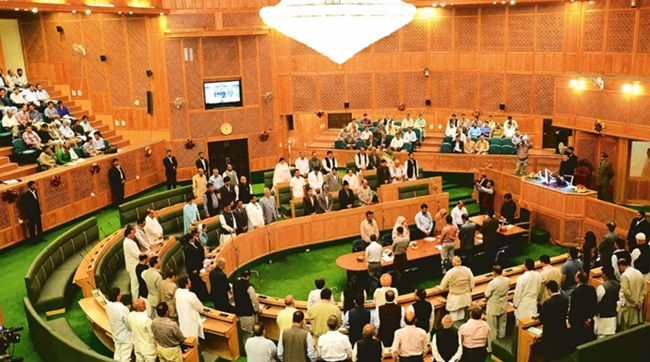| (General Studies Paper-2; Functions and responsibilities of the Union and the States, Issues and challenges related to the federal structure, Transfer of powers and finances at the local level and its challenges.) |

Reference:
Recently, assembly elections were held here for the first time after the formation of Jammu and Kashmir as a Union Territory. In such a situation, it is necessary to discuss the powers given to the newly formed assembly.
Jammu and Kashmir Reorganization Act, 2019:
- In the year 2019, Article 370 was repealed and Jammu and Kashmir was given the status of a Union Territory.
- The Jammu and Kashmir Reorganisation Act, 2019 created two Union Territories:
- Ladakh Union Territory without legislature
- Jammu and Kashmir Union Territory with legislature
- The Act amended the First Schedule to the Constitution, which lists all states and union territories.
- It also amended Article 3 of the Constitution, relating to the formation of new states and alteration of areas, boundaries or names of existing states.
- According to Section 13 of the Act, Article 239A of the Constitution (creation of local legislatures or Council of Ministers or both as applicable to certain Union Territories) relating to the administration of the Union Territory of Puducherry will also apply to the Union Territory of Jammu and Kashmir.
Administration of Union Territory of Delhi:
- Delhi is also a Union Territory with a legislature. For this, a separate provision has been made in the Indian Constitution under Article 239AA.
- Delhi as the national capital has a unique constitutional status, which has been the subject of several cases before the Supreme Court.
- The Supreme Court has upheld the powers of the legislature of Delhi in its decisions in the year 2018 and the year 2023.
- However, recent years have seen a constant political confrontation between the Lieutenant Governor and the state government.
Powers of Legislature vs Lieutenant Governor:
- In the case of Delhi Union Territory, three subjects land, public order and police are reserved for the Lieutenant Governor.
- Control over the 'services' or bureaucracy in Delhi has been a subject of dispute between the state and the central government.
- The Supreme Court has made it clear that the Lieutenant Governor of Delhi cannot exercise independent discretion on subjects other than the three reserved subjects.
- However, the central government extended the powers of the lieutenant governor by an act in 2023, bringing the bureaucracy under the lieutenant governor.
- The matter is still pending before the Supreme Court.
- Delhi's Anti Corruption Bureau (ACB) has also been an issue between the state and the central government.
- The Union Home Ministry issued a notification in 2015 according to which the Delhi government will have control over the ACB only to the extent it deals with the cases of Delhi bureaucrats and not government officials within the territorial jurisdiction of Delhi.
- The consent of the Home Ministry is required to prosecute central government officials working under the Delhi government.
Powers of Jammu and Kashmir Assembly
- As per the Instrument of Accession of 1947, Jammu and Kashmir had handed over only defense, foreign and communication related matters to the Government of India.
- Under the erstwhile Article 370, Parliament had limited legislative powers in respect of Jammu and Kashmir.
- However, the power of the Central Government to legislate in respect of Jammu and Kashmir has been expanded in the last few years.
- The structure established by the Reorganisation Act of 2019 has greatly enhanced the role of the Lieutenant Governor as compared to the State Legislature.
- According to Section 32 of the Act relating to the extent of legislative power of the Assembly, the Assembly can make laws with respect to any matter enumerated in the State List for the whole or any part of the Union Territory of Jammu and Kashmir.
- However, it cannot make laws on any matter relating to public order and police or any matter relating to Union Territories mentioned in the Concurrent List of the Indian Constitution.
- According to Section 36 relating to Financial Bills in the Reorganisation Act 2019, no Bill or amendment shall be introduced in the Legislative Assembly without the recommendation of the Lieutenant Governor.
- If such a Bill deals with amendment of the law of any financial obligation taken or to be incurred by the legislature of the Union Territory, among other aspects.
- This provision has wider significance as virtually every policy decision may give rise to a financial obligation for the Union Territory.
Powers of the Lieutenant Governor of Jammu and Kashmir:
- The Reorganisation Act of 2019 also specifies the powers of the Lieutenant Governor of Jammu and Kashmir.
- As per Section 53 of the Act, the Lieutenant Governor in the discharge of his functions shall act in his discretion in the following cases:
- Which are outside the scope of the powers conferred on the Legislative Assembly.
- In which he is required to act in his discretion or to perform any judicial function under any law.
- Relates to All India Services and Anti-Corruption Bureau.
- This means that apart from public order and police, bureaucracy and anti-corruption bureau will also be under the control of the Lieutenant Governor.
- The Act also provides that the decision taken by the Lieutenant Governor in his discretion will be final and the validity of any action taken by the Lieutenant Governor will not be questioned on the ground whether he should have acted in his discretion or not.
- Any advice given by ministers to the Lieutenant Governor will not be examined in any court.
- Recently, the powers of the Lieutenant Governor have been expanded and he has also been given the right to appoint Advocate General and Law Officers and to take decisions regarding prosecution and sanctions.



